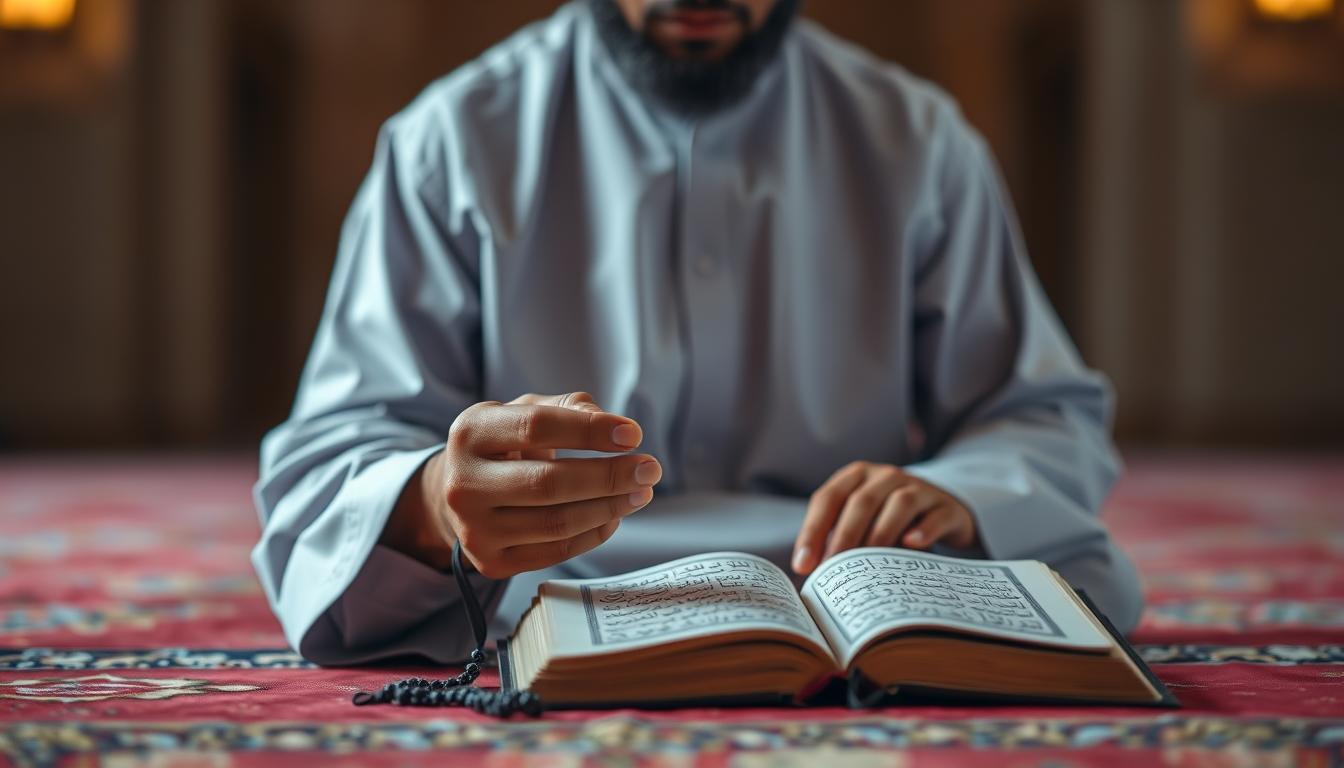Whether you’re seeking guidance for beginning your fast, breaking your fast at iftar, or maximizing the blessings of Laylat al-Qadr, this collection offers essential duas with their Arabic text, transliteration, and English translations. Let these powerful words connect you with Allah during this time of heightened spirituality and mercy.
The blessed act of making dua during Ramadan connects believers with Allah during this sacred month
The Significance of Dua in Ramadan
Dua (supplication) holds a special place in Islam as a direct communication with Allah. The Prophet Muhammad (peace be upon him) emphasized its importance by saying, “Dua is worship” (Sunan at-Tirmidhi). During Ramadan, our supplications carry even greater weight as this is a month when Allah’s mercy descends and the gates of heaven are wide open.
The Prophet (peace be upon him) said: “Three supplications will not be rejected: the supplication of a parent for their child, the supplication of the fasting person, and the supplication of the traveler” (Sunan Ibn Majah). This hadith highlights the special status of duas made while fasting during Ramadan.
Additionally, certain times during Ramadan are especially auspicious for making dua:
- The moment of breaking fast (iftar)
- During the last third of the night
- While in prostration (sujood) during prayers
- Between the adhan and iqama
- During the last ten nights of Ramadan, especially on Laylat al-Qadr
By making sincere dua during these blessed times, we increase our chances of acceptance and draw closer to Allah during this sacred month.

Families often gather to make dua together before breaking their fast during Ramadan
Duas for Beginning the Fast (Suhoor)
The pre-dawn meal (suhoor) before beginning the fast is a blessed time for making intentions and supplications. While there is no specific authentic dua reported from the Prophet (peace be upon him) exclusively for beginning the fast, the intention (niyyah) should be made in the heart. However, there are general duas that can be recited before eating suhoor.
Dua Before Eating Suhoor
Arabic: بِسْمِ اللّٰهِ
Transliteration: Bismillah
Translation: “In the name of Allah.”
If you forget to say this before starting your meal, you can say:
Arabic: بِسْمِ اللّٰهِ فِيْ أَوَّلِهِ وَآخِرِهِ
Transliteration: Bismillahi fee awwalihi wa aakhirihi
Translation: “In the name of Allah, in the beginning and in the end.”
Source: Sunan Abu Dawud 3/347, Sunan At-Tirmidhi 4/288
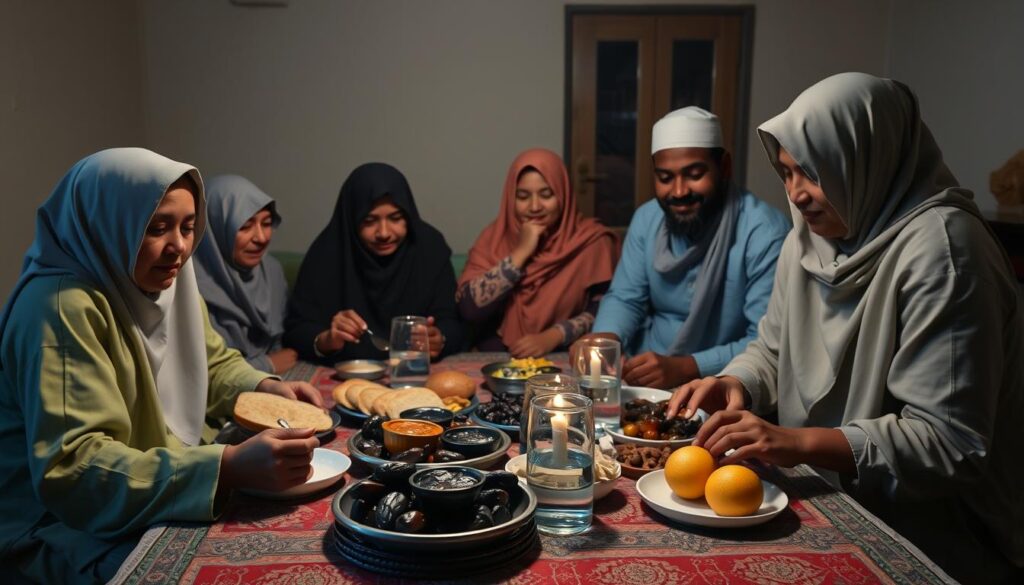
Suhoor is an important time for nourishment and making the intention to fast
Alternative Dua When Eating
Arabic: أَللَّٰهُمَّ بَارِكۡ لَنَا فِيهِ وَأَطۡعِمۡنَا خَيرًا مِّنۡهُ
Transliteration: Allahumma barik lana feehi wa at’imna khayran minhu
Translation: “O Allah, bless us in it and provide us with better than it.”
Source: Jami At-Tirmidhi 5/506, Sahih At-Tirmithi 3/158
Dua After Finishing Suhoor
Arabic: اَلْحَمْدُ لِلّٰهِ الَّذِيْ أَطْعَمَنِيْ هٰذَا، وَرَزَقَنِيْهِ، مِنْ غَيْرِ حَوْلٍ مِّنِّيْ وَلَا قُوَّةٍ
Transliteration: Alhamdu lillahil-lathee at’amanee hatha, wa razaqaneehi, min ghayri hawlin minnee wa la quwwatin
Translation: “Praise is to Allah Who has given me this food and sustained me with it though I was unable to do it and powerless.”
Source: Sahih-At-Tirmidhi 3/159
Remember that the intention to fast should be made in your heart before dawn (Fajr). The Prophet Muhammad (peace be upon him) said: “Whoever does not intend to fast before Fajr, there is no fast for him” (Sunan an-Nasa’i).
Duas for Breaking the Fast (Iftar)
The moment of breaking your fast is a blessed time when duas are readily accepted. The Prophet Muhammad (peace be upon him) taught us specific supplications to recite at iftar.
Dua for Breaking Fast (Iftar)
Arabic: ذَهَبَ الظَّمَأُ وَابْتَلَّتِ الْعُرُوْقُ، وَثَبَتَ الْأَجْرُ إِنْ شَاءَ اللّٰهُ
Transliteration: Dhahaba al-zama’u wa-btalat al-‘urooqu, wa thabata al-ajru in sha Allah
Translation: “The thirst is gone, the veins are moistened, and the reward is confirmed if Allah wills.”
Source: Sunan Abu-Dawud 2/306, Sahihul-Jami’ As-Saghir 4/209

Breaking fast with dates and water follows the Sunnah of Prophet Muhammad (peace be upon him)
Alternative Dua for Breaking Fast
Arabic: اللَّهُمَّ لَكَ صُمْتُ وَعَلَى رِزْقِكَ أَفْطَرْتُ
Transliteration: Allahumma laka sumtu wa ‘ala rizqika aftartu
Translation: “O Allah, for You I have fasted, and with Your provision I have broken my fast.”
Source: Sunan Abu Dawud (Note: Scholars like Sheikh Albani have classified this as Da’if or weak)
Dua for Seeking Forgiveness at Iftar
Arabic: أَللَّٰهُمَّ إِنِّى أَسۡأَلُكَ بِرَحۡمَتِكَ ٱلَّتِى وَسِعَتۡ كُلَّ شَيءٍ أَنۡ تَغۡفِرَ لِي
Transliteration: Allahumma inni as’aluka bi-rahmatika allati wasi’at kulla shay’in an taghfira li
Translation: “O Allah, I ask You by Your mercy, which encompasses all things, that You forgive me.”
Source: Ibn Majah 1/557, Al-Hafidh graded it as good in his checking of An-Nawawi’s Kitabul-‘Athkdr
Dua When Breaking Fast in Someone’s Home
Arabic: أَفۡطَرَ عِنۡدَكُمُ ٱلصَّائِمُونَ وَأَكَلَ طَعَامَكُمُ ٱلۡأَبۡرَارُ وَصَلَّتۡ عَلَيكُمُ ٱلۡمَلَائِكَةُ
Transliteration: Aftara ‘indakumus-sa’imuna wa akala ta’amakumul-abraru wa sallat ‘alaikumul-mala’ikatu
Translation: “With you, those who are fasting have broken their fast, you have fed those who are righteous, and the angels recite their prayers upon you.”
Source: Abu Dawud 3/367, Ibn Majah 1/556, An-Nasa’i, ‘Amalul-Yawm wal-Laylah 296-8
Duas During Fasting
While fasting, we may face various situations that require specific supplications. Here are some duas to recite during your fast.
When Insulted While Fasting
If someone insults you or tries to provoke you while you’re fasting, the Prophet (peace be upon him) taught us to respond with:
Arabic: إِنِّيْ صَائِمٌ، إِنِّيْ صَائِمٌ
Transliteration: Inni sa’im, inni sa’im
Translation: “I am fasting. I am fasting.”
Source: Sahih al-Bukhari, Sahih Muslim
This simple statement serves as a reminder to yourself and others about the sanctity of fasting and the importance of maintaining self-control and patience during this blessed time.

Reading Quran and making dua are recommended acts while fasting during Ramadan
Dua By One Fasting When Presented with Food
The Prophet Muhammad (peace be upon him) taught us the proper etiquette when invited to a meal while fasting:
“If you are invited [to a meal] then answer. If you happen to be fasting, then supplicate [for those present] and if you are not fasting, then eat.”
Source: Sahih Muslim 2/1054
When fasting and invited to a meal, it is recommended to make dua for the host and those present, asking Allah to bless them and their food.
Duas for Night Prayers (Taraweeh and Tahajjud)
The nights of Ramadan offer special opportunities for prayer and supplication, particularly during Taraweeh and Tahajjud prayers.
Dua After Witr Prayer
After completing the Witr prayer, it is recommended to recite the following dua three times, raising your voice on the third time:
Arabic: سُبْحَانَ الْمَلِكِ القُدُّوْسِ, رَبِّ الْمَلائِكَةِ وَالرُّوْحِ
Transliteration: Subhanal-Malikil-Quddoosi, Rabbil-mala’ikati war-rooh
Translation: “How perfect The King, The Holy One is. Lord of the angels and the Rooh (Jibreel).”
Source: Musannaf Ibn Shaybah: 2/93, Musnad Ahmad: 24/72
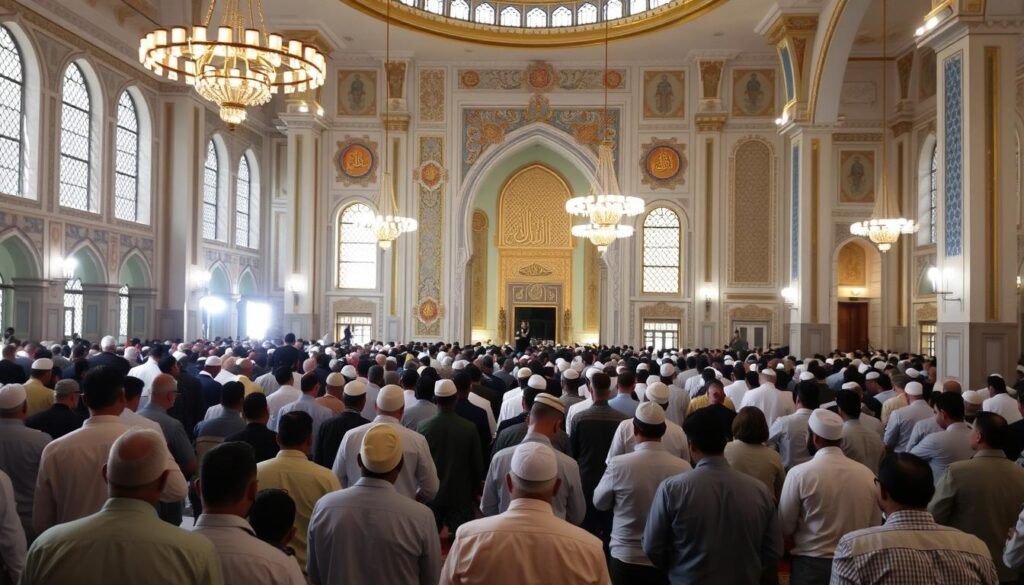
Taraweeh prayers are special night prayers performed during Ramadan
Dua for Guidance During Night Prayers
Since Ramadan is the month of the Quran’s revelation and guidance, this dua is particularly relevant:
Arabic: اللَّهُمَّ إِنِّي أَسْأَلُكَ الهُدَى وَ التُّقَى وَ العَفَافَ وَ الغِنَى
Transliteration: Allahumma inni as’alukal-huda wat-tuqa wal-‘afafa wal-ghina
Translation: “O Allah, I ask You for guidance, piety, abstinence (from asking people), and sufficiency.”
Source: Sahih Muslim: 2721
This beautiful dua encompasses the essence of what we seek during Ramadan: divine guidance, God-consciousness, self-restraint, and contentment with what Allah has provided.
Special Duas for Laylat al-Qadr (Night of Decree)
Laylat al-Qadr (the Night of Decree) is described in the Quran as “better than a thousand months” (Surah Al-Qadr). It falls within the last ten nights of Ramadan, with many scholars believing it is most likely on the odd nights (21st, 23rd, 25th, 27th, or 29th).
The Most Recommended Dua for Laylat al-Qadr
Aisha (may Allah be pleased with her) asked the Prophet (peace be upon him), “O Messenger of Allah, if I know which night is Laylat al-Qadr, what should I say during it?” He told her to say:
Arabic: اللَّهُمَّ إِنَّكَ عُفُوٌّ تُحِبُّ الْعَفْوَ فَاعْفُ عَنِّي
Transliteration: Allahumma innaka ‘afuwwun tuhibbul ‘afwa fa’fu ‘anni
Translation: “O Allah, You are pardoning and You love to pardon, so pardon me.”
Source: Sunan-at-Tirmidhi: 3513
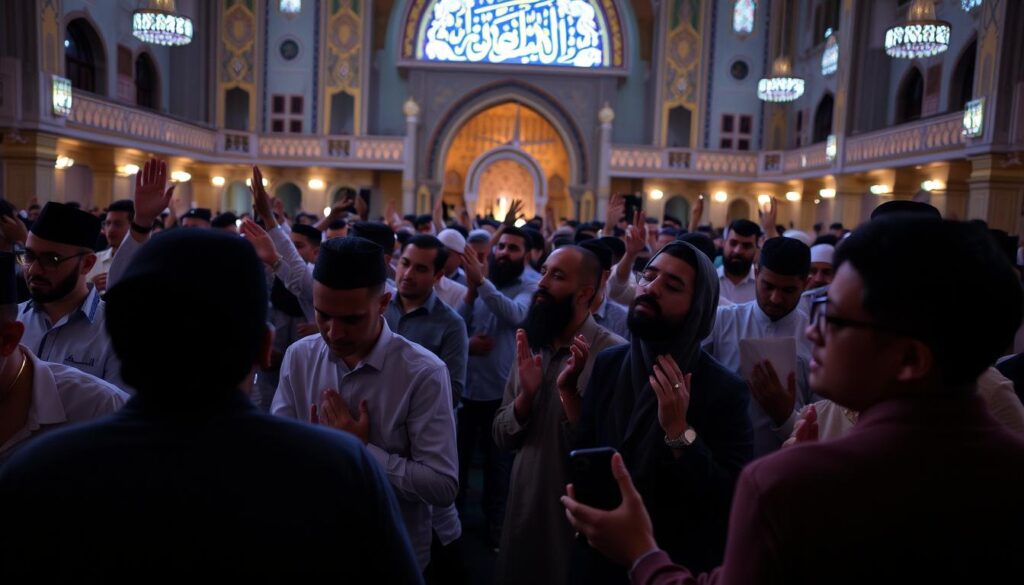
Laylat al-Qadr is considered the most blessed night of the year for worship and supplication
This concise yet profound dua focuses on seeking Allah’s forgiveness and pardon, which is especially important during this blessed night when Allah decrees the affairs of the coming year.
Additional Duas for Laylat al-Qadr
While the above dua is specifically recommended for Laylat al-Qadr, you can also make any sincere supplication from your heart. Some additional recommended duas include:
Arabic: رَبَّنَا ظَلَمْنَآ أَنفُسَنَا وَإِن لَّمْ تَغْفِرْ لَنَا وَتَرْحَمْنَا لَنَكُونَنَّ مِنَ ٱلْخَـٰسِرِينَ
Transliteration: Rabbana zalamna anfusana wa in lam taghfir lana wa tarhamna lanakunanna minal-khasireen
Translation: “Our Lord, we have wronged ourselves, and if You do not forgive us and have mercy upon us, we will surely be among the losers.”
Source: Surah Al-A’raf: 23
This is the dua that Adam and Eve (peace be upon them) made after they erred, and it’s a beautiful supplication for seeking forgiveness.
Morning and Evening Duas for Ramadan
Maintaining a regular practice of morning and evening supplications during Ramadan can significantly enhance your spiritual experience. Here are some essential duas to recite in the morning and evening.
Protection Dua (Three Times Morning and Evening)
Arabic: بِسْمِ اللهِ الَّذِي لَا يَضُرُّ مَعَ اسْمِهِ شَيْءٌ فِي الْأَرْضِ وَلَا فِي السَّمَاءِ وَهُوَ السَّمِيعُ الْعَلِيمُ
Transliteration: Bismillahil-ladhi la yadurru ma’asmihi shay’un fil-ardi wa la fis-sama’i wa huwas-Sami’ul-‘Alim
Translation: “In the Name of Allah with Whose Name there is protection against every kind of harm in the earth or the heaven, and He is the All-Hearing and All-Knowing.”
Source: Sunan Abu Dawud 5088; Sunan-at-Tirmidhi 3388
The Prophet Muhammad (peace be upon him) said: “He who recites this three times every morning and evening, nothing will harm him.”
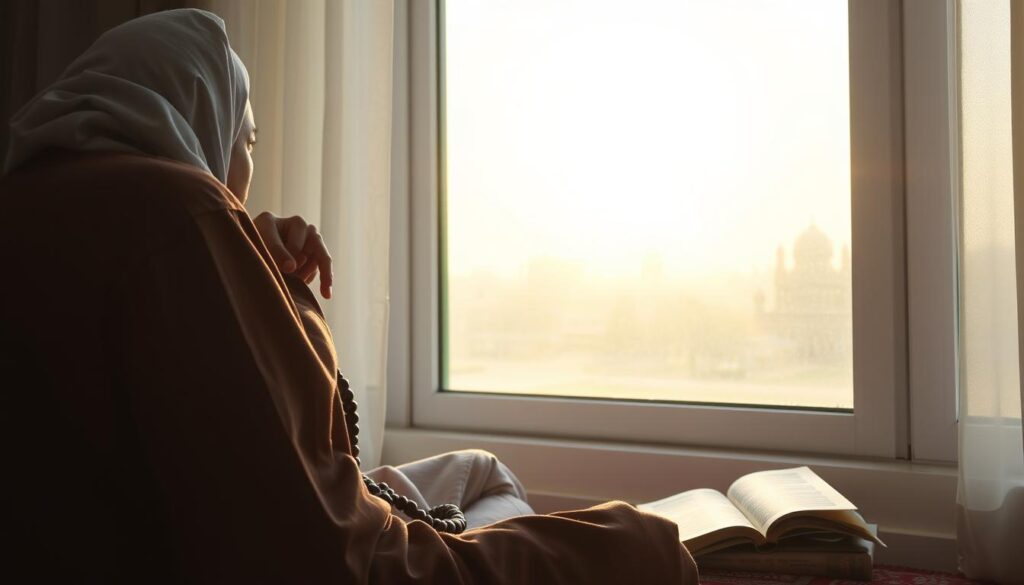
Morning and evening duas are an important part of daily worship during Ramadan
Sayyidul Istigfar (The Best Dua for Forgiveness)
The Prophet (peace be upon him) called this “the master of seeking forgiveness” and said that whoever recites it with conviction during the day and dies that day, or recites it with conviction during the night and dies that night, will enter Paradise.
Arabic: اللّٰهُمَّ أَنْتَ رَبِّي، لَا إِلٰهَ إِلَّا أَنْتَ، خَلَقْتَنِيْ وَأَنَا عَبْدُكَ، وَأَنَا عَلَى عَهْدِكَ وَوَعْدِكَ مَا اسْتَطَعْتُ، أَعُوْذُ بِكَ مِنْ شَرِّ مَا صَنَعْتُ، أَبُوءُ لَكَ بِنِعْمَتِكَ عَلَىَّ وَأَبُوءُ لَكَ بِذَنْبِيْ، فَاغْفِرْ لِيْ، فَإِنَّهُ لَا يَغْفِرُ الذُّنُوْبَ إِلَّاأَنْتَ
Transliteration: Allahumma anta Rabbi, la ilaha illa anta, khalaqtani wa ana ‘abduka, wa ana ‘ala ‘ahdika wa wa’dika mastata’tu, a’udhu bika min sharri ma sana’tu, abu’u laka bi ni’matika ‘alayya, wa abu’u laka bi dhanbi, faghfir li, fa innahu la yaghfirudh-dhunuba illa anta
Translation: “O Allah! You are my Lord. There is no true god except You. You have created me, and I am Your slave, and I hold to Your Covenant as far as I can. I seek refuge in You from the evil of what I have done. I acknowledge the favors that You have bestowed upon me, and I confess my sins. Pardon me, for none but You has the power to pardon.”
Source: Sahih al-Bukhari: 6306
Sending Blessings on the Prophet
Reciting this 10 times in the morning and 10 times in the evening brings great rewards:
Arabic: اَللّٰهُمَّ صَلِّ وَسَلِّمْ عَلَى نَبِيِّنَا مُحَمَّدٍ
Transliteration: Allahumma salli wa sallim ‘ala nabiyyina Muhammad
Translation: “O Allah, send prayers and peace upon our Prophet Muhammad.”
Source: At-Tabrani, Sahih at-Targhib wa at-Tarhib 1/273
The Prophet (peace be upon him) said: “Whoever recites blessings upon me ten times in the morning and ten times in the evening will obtain my intercession on the Day of Resurrection.”
Duas for Family and Children During Ramadan
Ramadan is a time to strengthen family bonds and pray for loved ones. Here are some beautiful duas from the Quran and Sunnah for your family.
Dua for Family Harmony
Arabic: رَبَّنَا هَبْ لَنَا مِنْ أَزْوَٰجِنَا وَذُرِّيَّـٰتِنَا قُرَّةَ أَعْيُنٍۢ وَٱجْعَلْنَا لِلْمُتَّقِينَ إِمَامًا
Transliteration: Rabbana hab lana min azwajina wa dhurriyyatina qurrata a’yunin waj’alna lil-muttaqina imama
Translation: “Our Lord! Bless us with pious spouses and offspring who will be the joy of our hearts, and make us models for the righteous.”
Source: Surah Al-Furqan: 74
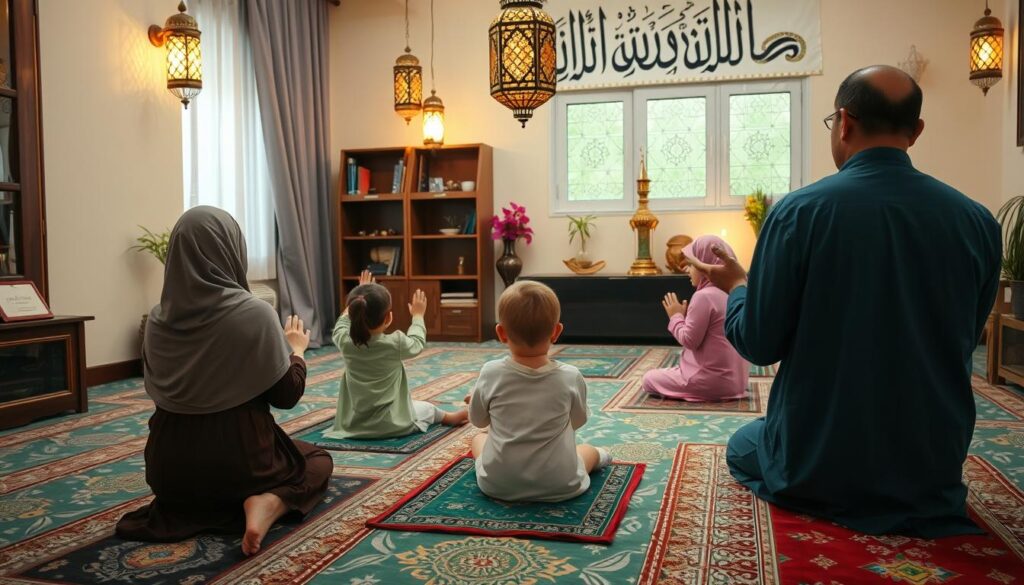
Praying together as a family strengthens bonds during Ramadan
Dua for Children’s Guidance
Arabic: رَبِّ اجعلنى مُقيمَ الصَّلوٰةِ وَمِن ذُرِّيَّتِي رَبَّنَا وَتَقَبَّلْ دُعَاءِ. رَبَّنَا ٱغْفِرْ لِى وَلِوَٰلِدَىَّ وَلِلْمُؤْمِنِينَ يَوْمَ يَقُومُ ٱلْحِسَابُ
Transliteration: Rabbi ij’alni muqimas-salati wa min dhurriyyati, Rabbana wa taqabbal du’a’. Rabbana-ghfir li wa liwalidayya wa lil-mu’minina yawma yaqumul-hisab
Translation: “My Lord! Make me and those believers of my descendants keep up prayer. Our Lord! Accept my prayers. Our Lord! Forgive me, my parents, and the believers on the Day when the account is established.”
Source: Surah Ibrahim: 40-41
This beautiful dua of Prophet Ibrahim (peace be upon him) asks Allah to make us and our children steadfast in prayer, while also seeking forgiveness for ourselves, our parents, and all believers.
Duas for Repentance and Forgiveness
Ramadan is a month of forgiveness, making it the perfect time to seek Allah’s pardon for our sins. Here are powerful duas for repentance.
Dua for Seeking Forgiveness
Arabic: رَبِّ إِنِّى ظَلَمْتُ نَفْسِى فَٱغْفِرْ لِى
Transliteration: Rabbi inni zalamtu nafsi faghfir li
Translation: “My Lord, indeed I have wronged myself, so forgive me”
Source: Surah Al-Qasas: 16
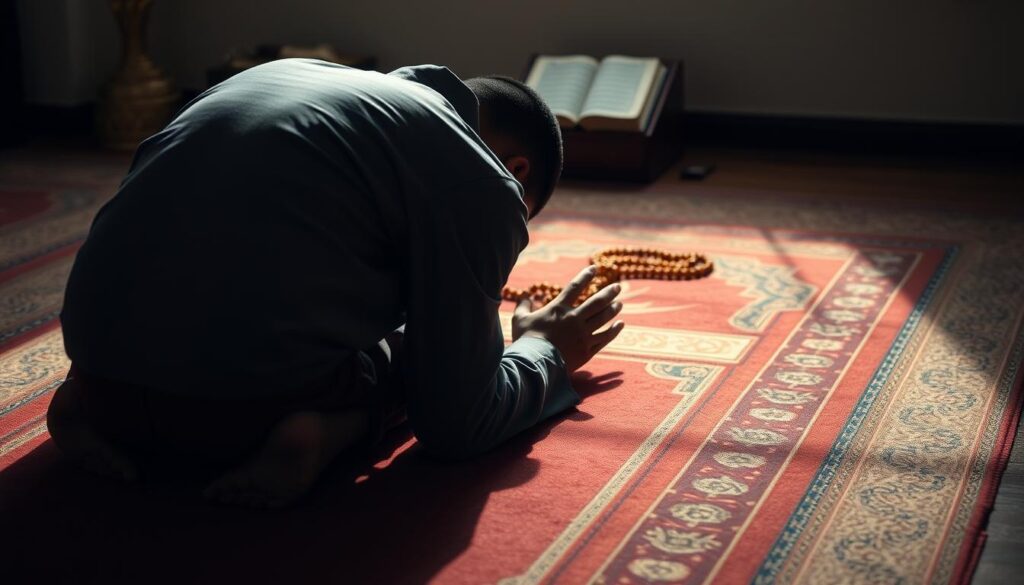
Prostration (sujood) is one of the best positions for making dua for forgiveness
Dua of Prophet Yunus (Jonah)
Arabic: لَّآ إِلَـٰهَ إِلَّآ أَنتَ سُبْحَـٰنَكَ إِنِّى كُنتُ مِنَ ٱلظَّـٰلِمِينَ
Transliteration: La ilaha illa anta subhanaka inni kuntu minaz-zalimeen
Translation: “There is no deity except You; exalted are You. Indeed, I have been among the wrongdoers.”
Source: Surah Al-Anbiya: 87
This is the dua that Prophet Yunus (peace be upon him) made from the belly of the whale. The Prophet Muhammad (peace be upon him) said: “The supplication of Dhun-Nun (Yunus) when he was in the belly of the whale was: ‘There is no deity except You; exalted are You. Indeed, I have been among the wrongdoers.’ No Muslim man supplicates with it for anything, ever, except Allah responds to him.” (Sunan at-Tirmidhi)
Duas After Obligatory Prayers
The time after obligatory prayers is especially blessed for making dua. Here are some supplications to recite after your five daily prayers during Ramadan.
Dua After Completing the Prayer
After saying the final salam in prayer, recite:
Arabic: أَسْتَغْفِرُ اللّٰهَ (three times)
Transliteration: Astaghfirullah (three times)
Translation: “I ask Allah for forgiveness.” (three times)
Then say:
Arabic: اَللّٰهُمَّ أَنْتَ السَّلاَمُ، وَمِنْكَ السَّلاَمُ، تَبَارَكْتَ يَا ذَا الْجَلاَلِ وَالْإِكْرَامِ
Transliteration: Allahumma antas-salam, wa minkas-salam, tabarakta ya dhal-jalali wal-ikram
Translation: “O Allah, You are Peace, and from You comes peace. Blessed are You, O Owner of majesty and honor.”
Source: Sahih Muslim 1/414
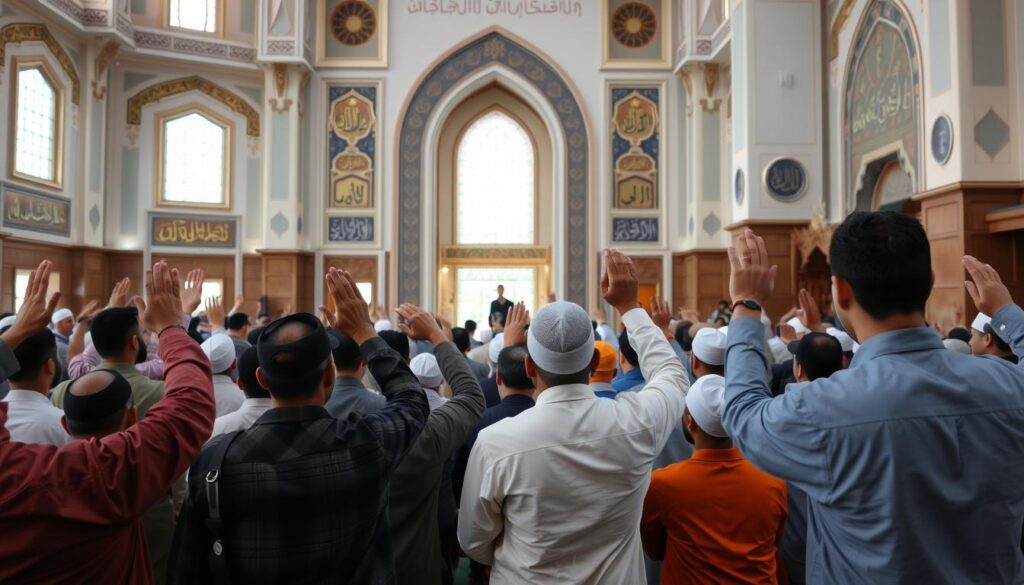
Making dua after obligatory prayers is highly recommended during Ramadan
Dhikr After Prayers
After every obligatory prayer, recite:
Arabic: لَا إِلٰهَ إِلَّا اللّٰهُ وَحْدَهُ لَا شَرِيْكَ لَهُ، لَهُ الْمُلْكُ وَلَهُ الْحَمْدُ وَهُوَ عَلَى كُلِّ شَيْءٍ قَدِيْرٌ
Transliteration: La ilaha illallahu wahdahu la sharika lahu, lahul-mulku wa lahul-hamdu wa huwa ‘ala kulli shay’in qadir
Translation: “None has the right to be worshipped but Allah alone, He has no partner, His is the dominion and His is the praise, and He is Able to do all things.”
Then say:
Arabic: اَللّٰهُمَّ لَا مَانِعَ لِمَا أَعْطَيْتَ، وَلَا مُعْطِيَ لِمَا مَنَعْتَ، وَلَا يَنْفَعُ ذَا الْجَدِّ مِنْكَ الْجَدُّ
Transliteration: Allahumma la mani’a lima a’tayta, wa la mu’tiya lima mana’ta, wa la yanfa’u dhal-jaddi minkal-jadd
Translation: “O Allah, there is none who can withhold what You give, and none may give what You have withheld; and the might of the mighty person cannot benefit him against You.”
Source: Sahih Al-Bukhari 1/255, Sahih Muslim 1/414
Reciting Ayatul Kursi
The Prophet (peace be upon him) said: “Whoever recites Ayatul Kursi after each obligatory prayer, nothing stands between him and entering Paradise except death.” (Sunan an-Nasa’i)
Ayatul Kursi is verse 255 of Surah Al-Baqarah:
Arabic: اللّٰهُ لَآ إِلٰهَ إِلَّا هُوَ الْحَىُّ الْقَيُّومُ ۚ لَا تَأْخُذُهُۥ سِنَةٌ وَلَا نَوْمٌ ۚ لَّهُۥ مَا فِى السَّمٰوٰتِ وَمَا فِى الْأَرْضِ ۗ مَن ذَا الَّذِى يَشْفَعُ عِندَهُۥٓ إِلَّا بِإِذْنِهِۦ ۚ يَعْلَمُ مَا بَيْنَ أَيْدِيهِمْ وَمَا خَلْفَهُمْ ۖ وَلَا يُحِيطُونَ بِشَىْءٍ مِّنْ عِلْمِهِۦٓ إِلَّا بِمَا شَآءَ ۚ وَسِعَ كُرْسِيُّهُ السَّمٰوٰتِ وَالْأَرْضَ ۖ وَلَا يَـُٔودُهُۥ حِفْظُهُمَا ۚ وَهُوَ الْعَلِىُّ الْعَظِيمُ
Translation: “Allah – there is no deity except Him, the Ever-Living, the Sustainer of [all] existence. Neither drowsiness overtakes Him nor sleep. To Him belongs whatever is in the heavens and whatever is on the earth. Who is it that can intercede with Him except by His permission? He knows what is [presently] before them and what will be after them, and they encompass not a thing of His knowledge except for what He wills. His Kursi extends over the heavens and the earth, and their preservation tires Him not. And He is the Most High, the Most Great.”
Duas for Paradise and Protection from Hellfire
During Ramadan, we should increase our supplications for Paradise and protection from Hellfire. Here are some powerful duas for this purpose.
Dua for Paradise and Protection from Hellfire
Arabic: اللّهُـمَّ إِنِّـي أَسْأَلُـكَ الجَـنَّةَ وأََعوذُ بِـكَ مِـنَ الـنّار
Transliteration: Allahumma inni as’alukal-jannata wa a’udhu bika minan-nar
Translation: “O Allah! I ask for Paradise. And I seek refuge in you from Hellfire.”
Source: Sunan Ibn Majah 2/328

Making sincere dua for Paradise and protection from Hellfire is especially important during Ramadan
Comprehensive Dua for This World and the Hereafter
This was the dua most frequently recited by the Prophet Muhammad (peace be upon him):
Arabic: رَبَّنَا آتِنَا فِي الدُّنْيَا حَسَنَةً وَفِي الْآخِرَةِ حَسَنَةً وَقِنَا عَذَابَ النَّارِ
Transliteration: Rabbana atina fid-dunya hasanatan wa fil-akhirati hasanatan waqina ‘adhaban-nar
Translation: “Our Lord! Give us in this world that which is good and in the Hereafter that which is good, and save us from the punishment of the Fire.”
Source: Surah Al-Baqarah: 201, Bukhari and Muslim
This comprehensive dua asks for goodness in both this life and the next, while seeking protection from Hellfire. Its brevity and completeness made it a favorite supplication of the Prophet (peace be upon him).
Tips for Maximizing Dua Acceptance During Ramadan
To increase the likelihood of your duas being accepted during Ramadan, consider these important guidelines:
Best Times for Making Dua
- The moment of breaking fast (iftar)
- During the last third of the night
- Between adhan and iqama (call to prayer and its establishment)
- While in prostration (sujood)
- After obligatory prayers
- On Fridays, especially in the last hour before sunset
- During rainfall
- During the last ten nights of Ramadan, especially on Laylat al-Qadr
Etiquettes of Making Dua
- Begin by praising Allah and sending blessings upon the Prophet (peace be upon him)
- Make dua with certainty and conviction that Allah will respond
- Raise your hands with palms facing upward
- Face the qiblah (direction of the Ka’bah)
- Make dua with humility and sincerity
- Avoid haste in expecting an answer
- Be specific in your requests
- End your dua by sending blessings upon the Prophet (peace be upon him)

Raising hands while making dua is from the Sunnah of the Prophet Muhammad (peace be upon him)
Actions That Increase Dua Acceptance
- Sincerity (Ikhlas): Ensure your intention is purely for Allah’s sake
- Repentance: Begin with sincere repentance for your sins
- Charity: Give charity before making dua
- Good Deeds: Increase in acts of worship and kindness
- Patience: Be patient and persistent in your supplications
- Lawful Consumption: Ensure your food, drink, and income are from halal sources
- Making Dua for Others: Include others in your supplications
- Avoiding Sin: Stay away from prohibited actions
Remember: Allah responds to duas in three ways: He may grant exactly what you asked for, He may avert a harm that would have befallen you instead, or He may save the reward of your dua for the Hereafter. Trust in His wisdom regarding which response is best for you.
Conclusion: Making the Most of Your Duas This Ramadan
Ramadan is a blessed month that offers unique opportunities for spiritual growth and connection with Allah. The duas presented in this Ramadan dua list are powerful tools to enhance your worship and draw closer to your Creator during this sacred time.
Remember that dua is not merely a ritual but a heartfelt conversation with Allah. While the Arabic formulations taught by the Prophet Muhammad (peace be upon him) carry special blessings, Allah understands all languages and knows what is in your heart. Don’t hesitate to supplement these traditional duas with your personal supplications in whatever language feels most natural to you.
As you navigate through this Ramadan, keep this dua list handy for reference during suhoor, iftar, night prayers, and other special moments. The consistency and sincerity of your supplications matter more than their length or eloquence. Even a short, sincere dua made with a present heart is beloved to Allah.
May Allah accept all your duas, forgive your sins, and grant you the ultimate reward of Jannatul Firdaus (the highest level of Paradise). Ramadan Mubarak!
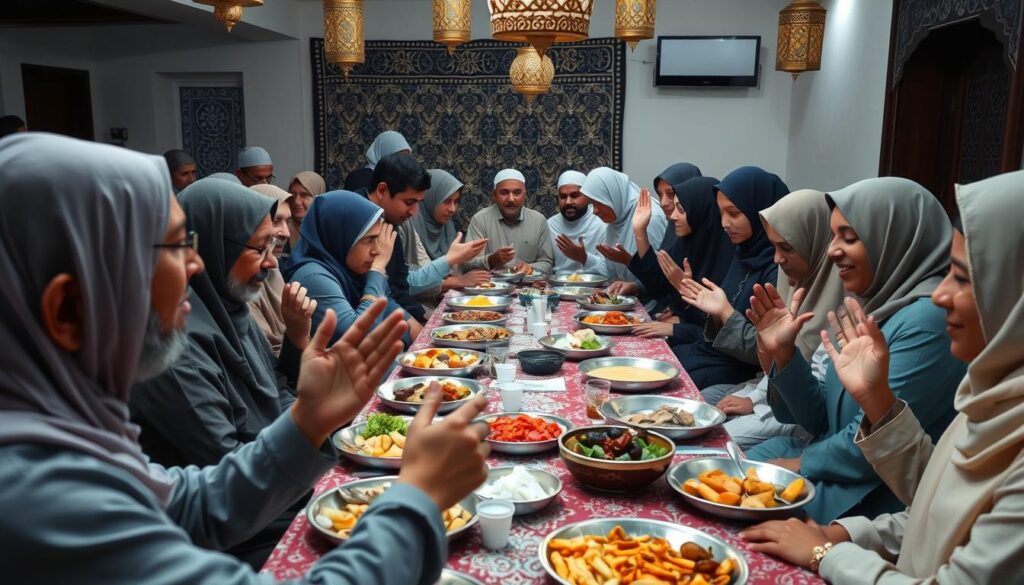
Ramadan brings communities together in worship, dua, and celebration
Download Your Complete Ramadan Dua List
Get our printable PDF with all the essential Ramadan duas in Arabic, transliteration, and English translation. Perfect for daily reference during the holy month.
Download Your Complete Ramadan Dua List
Get our printable PDF with all the essential Ramadan duas in Arabic, transliteration, and English translation. Perfect for daily reference during the holy month.

